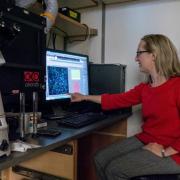Research in my lab is focused on understanding how signaling events control cell fate. Studying these processes in single cells reveals remarkable cell-to-cell variability in response to stimuli, even among genetically identical cells in a uniform environment. We seek to understand the sources and consequences of this heterogeneity in cellular response to stimuli such as growth factors, cell stress, and targeted cancer therapeutics. To do this, we develop genetically encoded fluorescent sensors for signaling events of interest and use long-term live-cell microscopy and cell tracking to quantify the dynamics of upstream signals and link them to cell fate (proliferation, quiescence, apoptosis, senescence.) Our long-term goal is to understand the normal mechanistic functioning of signaling pathways, to understand how these signals go awry in cancer, and eventually to alter the fate of individual cells.
Projects in the lab range from regulation of the cell cycle, to sensor and tool development, to more translational projects looking at the misregulated proliferation of cancer cells. We are actively recruiting new members, so if you would like to hear more about specific projects in the lab, please contact Sabrina Spencer at sabrina.spencer@colorado.edu.





